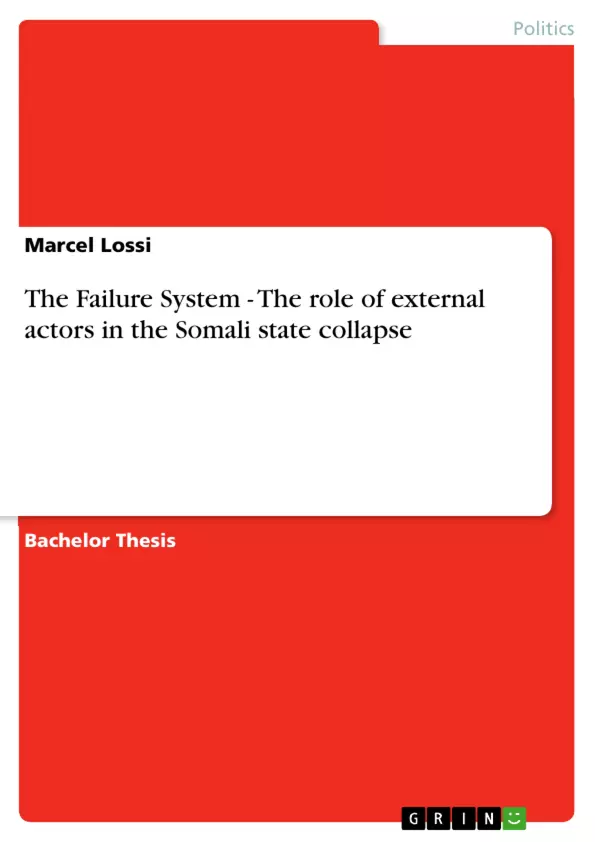1. Introduction
Since the fall of the Barre regime in 1991, Somalia has been the most profound and outstanding example of state failure not only in Africa but the entire world. For almost 20 years Somalia has been lost in a vicious circle which the author of this paper calls “the failure system”. It is a system of mutually reinforcing factors consisting of clan violence and a corresponding history of real or imagined marginalisation, the establishment of war economics, various jihads and last but not least the interference of a multitude of external actors. The question of this bachelor thesis is: What role did external actors take in the process of state failure in Somalia? My hypothesis is, that the Somali state collapse cannot be seen as a purely internal phenomenon but rather as a layered systemic process that has been influenced by external actors on a massive scale. The main purpose of this bachelor thesis is to outline the role of external actors in the Somali state collapse. Albeit the focus of this work is clearly the external dimension of this conflict, we shall not neglect the internal actors and factions in Somalia. Especially after the Ethiopian invasion of 2006 and the begin of the international anti-pirate mission at the Horn of Africa a whole pile of scientific literature has been written on external actors and their strategic motivations in Somalia. But usually these publications only focus on the external actors and their motivations without appropriately addressing internal dynamics. In order to bridge the gap of understanding between the layers of internal and external conflict dimensions, this work tries to create a holistic and systemic big picture view of the Somali state collapse by outlining historical, sociological, internal and external factors alike. To achieve this goal, this work has been divided into three main parts.
The first part will briefly describe the Somali history. I will at first outline the historic developments before 1991 to give an impression of the long-term development of the country. Subsequently the clan structure and its relevance will be addressed to answer the question why such a high internal conflict potential could arise in Somalia despite far reaching ethnic, cultural, religious and lingual homogeneity. Afterwards the historic events in the state-failure period from 1991-2009 will be described. The main sources for this
Inhaltsverzeichnis (Table of Contents)
- Introduction
- The history of the Somali conflict
- Somali history before 1991
- Digression: The Somali clan system
- Somali history since 1991
- Important internal actors and factions in Somalia
- The Transitional Federal Government and allied groups
- Autonomous regions
- Warlords and anti-government groups
- External actors in the Somali conflict
- Theoretical perspectives: The internationalisation of internal conflicts
- Neighbouring States
- Ethiopia
- Eritrea
- Djibouti
- Kenya
- Global actors
- United States
- European States
- Arab League states
- International Organisations
- African Union
- United Nations
- IGAD
- Non-state external actors
- The Somali diaspora
- Conclusion
Zielsetzung und Themenschwerpunkte (Objectives and Key Themes)
This bachelor thesis aims to analyze the role of external actors in the Somali state collapse. The work argues that the collapse cannot be solely attributed to internal factors but rather resulted from a layered systemic process influenced by external actors.- The historical development of Somalia and its clan system as a foundation for understanding the conflict
- The role of internal actors and factions in shaping the conflict dynamics
- The influence of external actors, including neighboring states, global powers, international organizations, and non-state actors, on the Somali state collapse
- The impact of the internationalization of internal conflicts on Somalia
- The intricate interplay between internal and external forces in the Somali state collapse
Zusammenfassung der Kapitel (Chapter Summaries)
The first chapter outlines the historical development of Somalia leading up to the collapse of the Barre regime in 1991, highlighting the significance of the clan system in shaping internal conflict dynamics. The second chapter delves into the various internal actors and factions within Somalia, including the Transitional Federal Government, autonomous regions like Somaliland and Puntland, and anti-government groups. The third chapter examines the role of external actors in the Somali conflict, beginning with a theoretical framework for understanding the internationalization of internal conflicts. The chapter then analyzes the motivations and actions of neighboring states, global actors, international organizations, and non-state actors, emphasizing the complex network of influences and interests that have shaped the Somali state collapse.Schlüsselwörter (Keywords)
The key focus areas of this work are the Somali state collapse, external actors, internal conflicts, the internationalization of conflicts, the role of neighboring states, global powers, international organizations, non-state actors, the Somali diaspora, and the Somali clan system.Frequently Asked Questions
What is the "failure system" in Somalia?
It is a vicious circle of mutually reinforcing factors like clan violence, war economics, jihads, and the interference of external actors that led to the state collapse.
Who are the key external actors in the Somali conflict?
Key actors include neighboring states (Ethiopia, Kenya, Eritrea), global powers (USA, EU), and international organizations (UN, African Union).
How does the clan system influence the conflict?
Despite ethnic homogeneity, the clan structure creates high internal conflict potential through real or imagined marginalization and power struggles.
What role does the Somali diaspora play?
The diaspora is a significant non-state external actor that influences the conflict through financial remittances and political involvement from abroad.
What is the hypothesis of this bachelor thesis?
The hypothesis is that the Somali state collapse is not purely internal but a systemic process heavily influenced by a multitude of external actors.
- Quote paper
- Marcel Lossi (Author), 2009, The Failure System - The role of external actors in the Somali state collapse, Munich, GRIN Verlag, https://www.grin.com/document/182468



